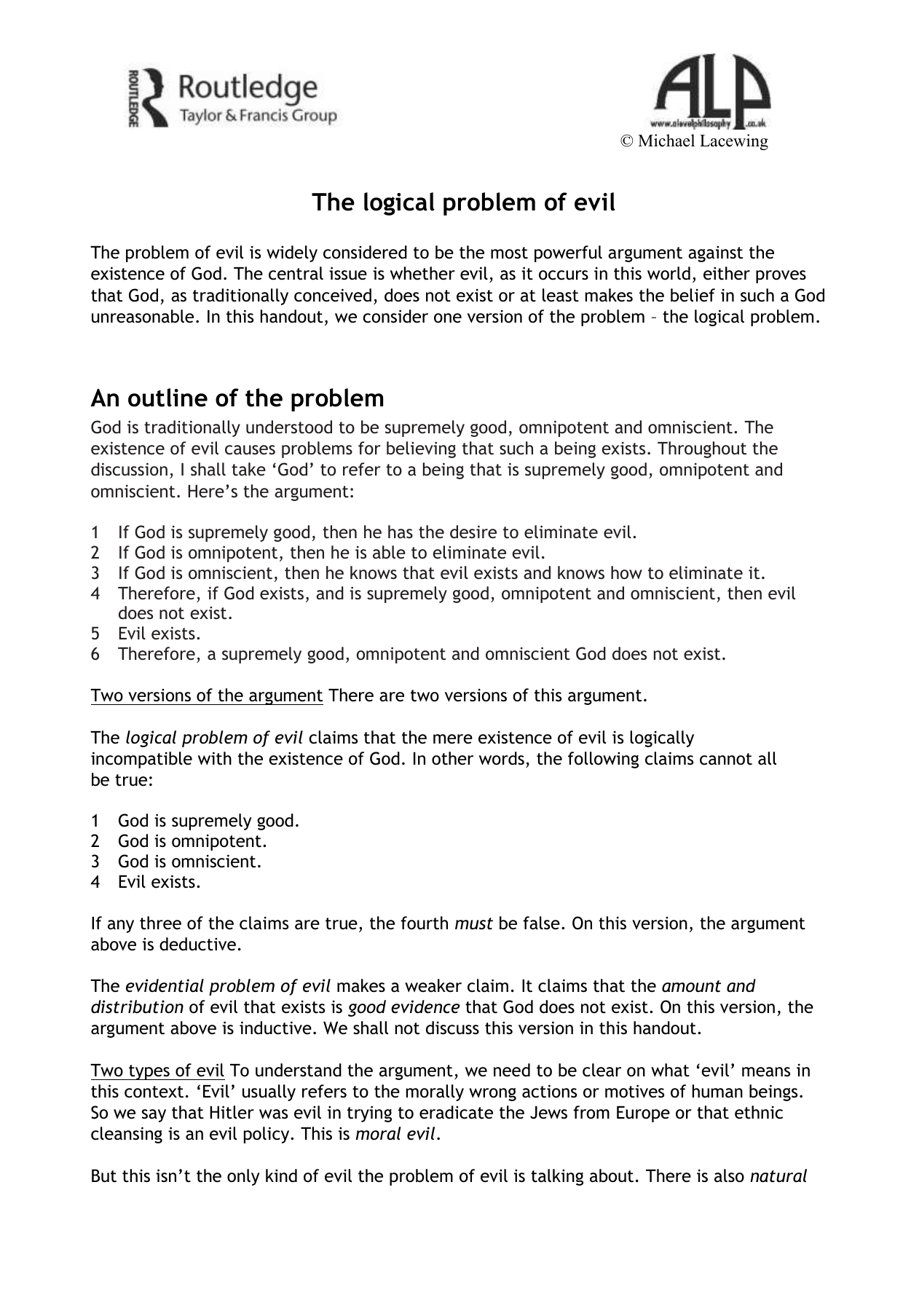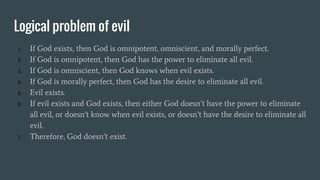The Logical/deductive Problem of Evil Is Best Described as
This chapter shows that the logical problem of evil is far from dead. Logical problem of evil First it can be formulated as a purely deductive argument logical version of the argument that attempts to show that there are certain facts about the evil in the world that are logically incompatible with the existence of God.

The Evidential Problem Of Evil Ppt Download
The theistic claims utilized by the new problem are claims about Gods unsurpassable greatness ontological.

. Assessing the claim that the traditional concept of God and the existence of evil are logically contradictory. It was popularized by David Hume. Premise 2- God is all-good.
Religious philosophers have tried to show ways in which the presence of suffering could be compatible with the existence of an all-powerful loving God. Is God willing to prevent evil but not able then he is not omnipotent 2. The best known presentation of the problem is attributed to the Greek philosopher Epicurus.
This argument both positively states that evil exists in the world and normatively states that if God existed there. To refute the logical version of the internal problem of evil the theist does not have to suggest a plausible or likely solution-all he has to do is suggest a possible one. 221 Good cannot exist without evil since evil is necessary as a counterpart to good.
The problem of evil refers to the question of how to reconcile the existence of evil with an omnibenevolent omniscient and omnipotent God see theism. Is the existence of evil logically compatible with a necessarily benevolent and. The logical problem can be contrasted with the evidential problem of evil which does not claim that just any evil would be inconsistent with God but that the.
Premise 3- Evil exists. But does it seem that even the best responses to the problem of evil turn out to be less than conclusive. The evidential or inductive argument claims that while at least some evil is logically compatible with the existence of God the amount and diversity of evil that exists constitutes evidence against the existence of God making.
Greek philosopher Epicurus defined the problem of evil in the quote. Either as a deductive argument or as an inductive argument. There are currently differing definitions of these concepts.
The problem of evil is the question of how to reconcile the existence of evil and suffering with an omnipotent omnibenevolent and omniscient God. If it is possible that God has a sufficient reason the deductive argument is defeated. The problem of evil is the reconciliation between the existence of suffering and evil in the world with an omnipotent all powerful omniscient allknowing and omnibenevolent infinitely kind GOD.
Now one might say that that seems pretty unlikely. The Deductive Problem of Evil. Premise 1- God is all-powerful.
The deductive form of the problem asks the following. The evidential problem of evil takes up a different question. Dont these explanations wear thin when we confront the suffering of an innocent child.
Perhaps the most well-known example of the former comes from the late Australian philosopher John L. Attempts to show the contrary have traditionally been discussed under the heading of theodicy. The theistic answer to the deductive problem of evil is based on the claim that it is possible that God has a good reason for all of the evil He allows.
The deductive argument from evil is an explanation for the incompatibility of evil and a three-O God. 2 Solutions to the problem of evil. The existence of evil poses both a logical and empirical problem for theism forming the basis of both a deductive argument that attempts to deduce a contradiction from the existence of both God and evil and an inductive argument that contends that it is improbable that God is the creator of a world that contains the amount and kinds of evils found in this one.
The logical or deductive argument claims that the fact of evil is logically incompatible with the existence of an omniscient omnipotent wholly good God. 224 Evil is necessary for. It answers to the problem of evil which is the problem of whether or not such a God could logically coexist with evil.
The problem has two basic formulations one is deductive the other inductive. The evidential version of the problem of evil also referred to as the probabilistic or inductive version seeks to show that the existence of evil although logically consistent with the existence of God counts against or lowers the probability of the truth of theism. The logical problem of evil can then be cast as a deductive argument from the premise that evil does in fact exist to the conclusion that the God of traditional theism omnipotent omniscient perfectly good does not exist.
An argument from evil attempts to show that the co-existence of evil and such a God is unlikely or impossible. The Problem of Evil - Part 2. May I go on to explain why certain elements in.
Broadly speaking the problem of evil can be formulated in two ways. Logicaldeductive Evidentialinductive Logical Problem of evil. Mackie argued that the following two statements are logically contradictory.
But then one would be confusing once again the logical problem of evil with the probabilistic problem of evil. As an example a critic of Plantingas idea of a mighty nonhuman spirit causing natural evils may concede that the. The Deductive Problem of Evil.
If God is able to prevent evil but not willing then he is melevolent 3. 222 Evil is necessary as a means to bringing about goodness. One of the major philosophical debates concerning Gods existence involves the problem of evil.
The logical version of the problem of evil also known as the a priori version and the deductive version is the problem of removing an alleged logical inconsistency between certain claims about God and certain claims about evil. Thank you very much for your response to my questions regarding the problem of evil. It does so by producing a new problem entirely distinct from the old problem of Epicurus Hume and Mackie which was so influentially addressed by Plantinga.
223 A universe with some evil is better than a universe with none. I am sincerely grateful for your taking the time to consider what I wrote to you.

What Is The Logical Problem Of Evil Identified By Epicurus Page 4 Ppt Download


Comments
Post a Comment